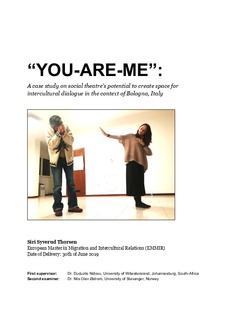"YOU-ARE-ME": A case study on social theatre’s potential to create space for intercultural dialogue in the context of Bologna, Italy
Master thesis
Submitted version
Permanent lenke
http://hdl.handle.net/11250/2620391Utgivelsesdato
2019-06-30Metadata
Vis full innførselSamlinger
- Studentoppgaver (HF-IGIS) [1002]
Sammendrag
In a time characterized by globalized migration patterns and consequential cultural diversity, intercultural conflicts, prejudice and xenophobia are potential threats to peaceful co- existence. However, research on the topic of intercultural dialogue is often vague, traditional and overly theoretical, despite a growing need for new and creative ways of facilitating dialogue amongst people ascribing to different identities. This dissertation aims to explore what an artistic and creative approach can contribute in this regard, and in the format of a case study, it asks: How can social theatre create space for intercultural dialogue in a multinational workshop in Bologna, Italy?
Guided by principles of participatory action and art-based methodologies, the 8-week workshop “YOU-ARE-ME” was held with a group of Bolognese inhabitants from 14 different countries. Data material was gathered through questionnaires, participatory observation in all drama exercises, and post-workshop individual interviews. The findings indicate that the method of social theatre could better the chances of dialogical moments with its influence on the participants notions of their similarities and differences, the communication amongst them and the role and importance of facilitation. Overall, social theatre could enable showcasing of human complexity and paradoxes, interpersonal bonding, empathy, vulnerability, individual development, storytelling, embodied expression and realization, and raw expression, as well as impacting group atmosphere and levels of comfort and discomfort. However, distinct limitations to the theatre approach were visible in the data, specifically concerning time, drama experience, power and facilitation. All in all, this study demonstrate how social theatre can be a fruitful approach to create space for dialogue with enough time, skill, scrutinization of power relations and proper facilitation. Furthermore, its findings point to the importance of including the role of facilitation and embodied realities and expression in future research on intercultural dialogue.
Beskrivelse
Master's thesis in Migration and Intercultural Relations
